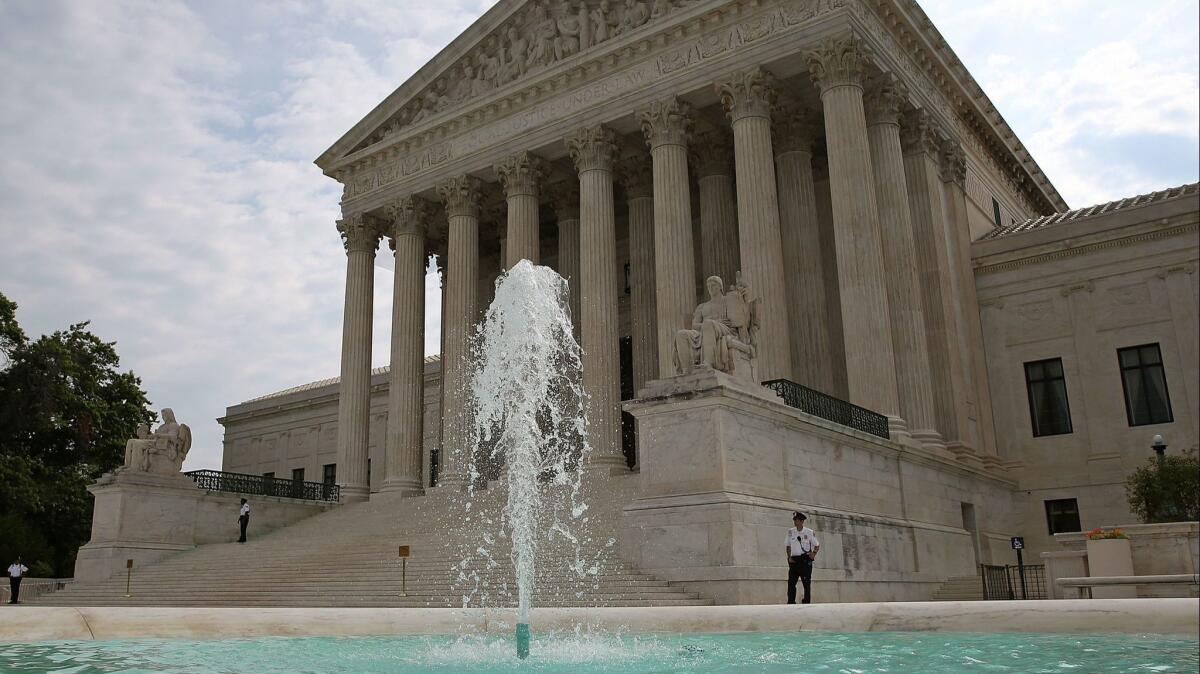Supreme Court to decide on reining in class-action deals that only pay lawyers and their favored institutions

- Share via
Reporting from Washington — The Supreme Court agreed Monday to consider reining in deals in class-action cases that yield millions of dollars in fees for lawyers, millions more in awards for their favored universities and little or nothing for the plaintiffs who were allegedly injured.
The justices will review an $8-million settlement in a privacy suit against Google that was upheld last year by the 9th Circuit Court of Appeals as “fair, reasonable and adequate.” It awarded about $2.2 million to the lawyers who sued and $5,000 to each of three named plaintiffs. Both sides agreed to distribute $5.3 million to several universities and think tanks they had selected. None of the money would go to the other estimated 129 million plaintiffs.
Critics of these settlements described them as a form of suspect collusion between plaintiffs’ lawyers and corporate defendants, since both benefit by arranging a settlement. Leading the challenge to these deals is Ted Frank, a Washington lawyer who regularly objects to class-action settlements.
In an unusual move, the Supreme Court voted to hear his appeal over the objections of both Google and the plaintiffs, the two parties to the case. In Frank vs. Gaos, he urged the court to “correct a serious abuse of the class-action mechanism that puts the interests of those it is intended to protect — class members — dead last.”
At issue is a so-called cy pres settlement, a French term meaning “as near as possible.” This idea was originally used in trust settlements where it was no longer possible to use the money for the intended purpose. Lawyers cited the 19th-century case of a trust fund devoted to supporting the abolitionist movement that was used after the Civil War to provide aid to African Americans.
The same idea has been used in class-action settlements when it is not possible or practical to distribute the money as originally intended. The Google suit was said to speak for 129 million Google users whose privacy was infringed when their search terms were passed on to “third parties,” like advertisers. Google offered to provide more disclosures online.
The plaintiffs’ lawyers said the $5.3-million portion of the settlement would have yielded each of the plaintiffs about 4 cents. Instead, they proposed to distribute the money among six universities, research centers or groups that are concerned with privacy on the internet. They included the World Privacy Forum, Harvard’s Berkman Klein Center for Internet and Society, Carnegie Mellon University, the Chicago-Kent College of Law, AARP and Stanford Law School’s Center for Internet and Society.
A federal judge in Northern California approved the settlement, and the 9th Circuit affirmed that decision.
Frank, director of the Center for Class Action Fairness, says he intervenes in cases where he believes the lawyers “are operating in their own self-interest.” In the Google case, he said the lawyers could have established a settlement fund and waited to see how many people would file a claim.
Increasingly, he said, lawyers opt for a cy pres award because it allows them to settle the case with a minimal effort and a healthy fee. His appeal contends these settlements are quite common. They are “typical in the current wave of data-breach class-action settlements,” he said. Rather than compensate large numbers of people for injuries or losses, these settlements “transform the class action … into a fundraising opportunity for the class counsel’s favorite charities.”
The high court said it will hear a challenge to such arrangements in the fall.
“We are hopeful that the Supreme Court’s review will result in a standard forbidding attorneys from misusing class-action settlements to selfishly put themselves and third parties ahead of their clients,” Frank said Monday in response to the court’s action.
More stories from David G. Savage »
Twitter: DavidGSavage
UPDATES:
1:25 p.m.: This story was updated with additional background about Frank.
This story was originally published at 10:55 a.m.
More to Read
Get the L.A. Times Politics newsletter
Deeply reported insights into legislation, politics and policy from Sacramento, Washington and beyond. In your inbox three times per week.
You may occasionally receive promotional content from the Los Angeles Times.











